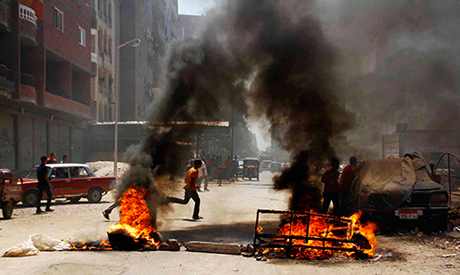At least six people were killed on Thursday and tens arrested as police moved to suppress small-scale demonstrations organised by Islamists across Egyptian cities to mark the anniversary of last year’s killings of protesters,security sources and Al-Ahram Arabic news website said.
Hundreds were killed on 14 August 2013 when security forces violently cleared the sizeable protest camps set up by supporters of deposed Islamist president Mohamed Morsi in Rabaa Al-Adawiya and Nahda squares, in one of the worst bloodshed in Egypt’s modern history.
Official government estimates put the death toll from both sit-ins at over 600.
Islamists’ street presence has significantly tailed off as Morsi loyalists have struggled to drum up support amid a relentless security crackdown since the army overthrew Morsi in July 2013. Hundreds of Morsi supporters have been killed in street showdowns over the past year and thousands others jailed, with many facing hurried trials on charges of violence.
A pro-Morsi grouping, the Anti-Coup Alliance, had called for nationwide rallies on Thursday under the banner of “We Demand Retribution” – but the calls have failed to muster large numbers and the scattered protests were swiftly quelled by police.
Still, five protesters died in clashes on Thursday, according to a security source and Al-Ahram’s Arabic news website. Two people were shot dead during confrontations between pro-Morsi protesters and riot police in Giza. Another two were killed when supporters and opponents of the ousted president clashed in a northern Cairo district.
A fifth died after clashes between protesters and police in the south of Cairo, a security source said. The sixth fatality was a police sergeant, who was shot dead by unknown assailants early on Thursday in the southern Cairo suburb of Helwan.
“Today is a typical, recurrent scene that is emblematic of the stark contrast between desire and capability,” Ammar Ali Hassan, an Islamist thinker and analyst, said.
“The Muslim Brotherhood has spoken of vast numbers and tremendous changes and they wind up having weak scattered protests punctuated by violence that eventually achieve nothing,” Hassan added.
The Brotherhood rose to power in 2012 after decades in the shadows of successive governments. But the group fell from grace a year later when the military ousted its leader Morsi after millions protested against his rule, accusing him of power grabbing and mismanaging the country’s battered economy.
Security forces used tear gas on Thursday to disperse small protests in Cairo, Alexandria and other cities as demonstrators set tyres alight and blocked major roads while chanting against the military and raising the four-fingered Rabaa salute, a symbol of Islamists’ defiance.
Similar skirmishes were reported in the Nile Delta and southern governorates of Qena and Minya.Over a dozen were injured in the violence, a security source has said.
The interior ministry said in a statement that almost two dozen explosive devices were defused and 114 alleged Brotherhood members were arrested on Thursday in eight governorates including Cairo, Giza, and the Nile Delta’s Qalioubiya, Daqahliya.
“At first the [Islamist] street movement used to confuse security forces and was quicker than the police,” Hassan argued. “Police used to react. Now they take the first move.”
Once Egypt’s largest and most organised political movement, Morsi’s Brotherhood has been dilapidated by the worst crackdown in its 85-year history since Morsi’s removal.
Morsi and much of the group’s upper echelons are embroiled in multiple court cases over charges including murder.
At the same time, militant attacks by Sinai-based fighters have surged since Morsi was removed. The violence has mainly targeted police and soldiers but also led to civilian casualties.

